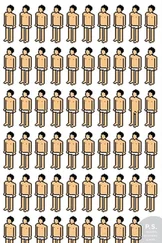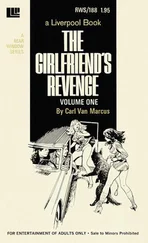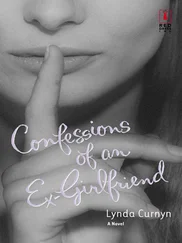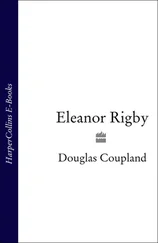Chilly, she wore three sweaters and a pair of Richard's gray work socks; her legs that morning were sore and hard to move. She was listlessly watching CNN while trying to unscrew a coffee thermos, at which point the TV screen fuzzed into snow and then flared a brilliant white. She looked up and dropped the thermos. Other lamps in the TV room as well as the kitchen pulsed brightly then browned out while the entire house bumped and wavered as though it were an improperly docking boat.
"It's you," Karen said. "You. You're finally here."
Yes.
To her right, the glass patio door jiggled as she watched its hook unlatch itself—clack. With a rusty dry squeaking, the glass slid across its floor runner and the rain blew a cluster of brown leaves inside. Karen began to caterpillar her body across the room, a throw rug caught on her numb senseless legs like sacks of potatoes strapped onto her waist. Brisk wet air and rain slapped her face as she neared the sliding door. Oh God, the glass is so heavy. Go away. A tug of war began between herself and the door's mass.
Show yourself, Karen said, her weak spindly hands aching as she pushed the door closed ever so slowly. Why'd you do this? Why'd you take my youth? Go away. I know you're here. That should be enough.
She was crying, her face wet, her hands red, feeling as though the tendons were peeling like ribbons from her bones. With a final jolt, the door slammed shut and she fell exhausted onto the linoleum's ancient daisies. There. And then came a crash from the outside, like a tackled football player, oomph, the sliding door's glass shattering into a spider's web lace, a million tiny shards in a fraction of a second—yet only a few tiny shards tinkling out from the middle, allowing the wind to whistle through the small remaining hole. Karen screamed and thenwent silent, laid back on the floor, stared at the ceiling, and waited for what could only be bad news. She grabbed a cool, soft cushion that had fallen from the couch and used it to calm her eyes, holding it over her face. The TV resumed its babbling in the background; Karen found the remote button and began recording a tape.
She thinks: I had so little time to enjoy the world and now it's soon to be over. I don't want to live in what this world is about to become. I yearn to leave my body. I yearn to leave this life quickly and cleanly, as though falling into a mine shaft. I want to climb a mountain—any mountain—and put the world behind me, and when I reach the top turn into a piece of the sun. My body is so weak and scrawny. I miss holding things. I miss wiggling my toes and I miss my period. I never held Megan as a baby.
She thinks: I used to ski once. The sky would be so cold it ached, but I was warm and I sped down the snow like a dancer. I used to jump and twirl. And I've never complained until now—not once. But I wanted to enjoy the world a bit more—just a little bit more.
She can hear a helicopter overhead and booms from downtown. It's happening quickly, isn't it?
She closes her eyes and she sees things—images of blood and soil mixed together like the center of a Black Forest cake; Grand Canyons of silent office towers. Houses, coffins, babies, cars, brooms, and bottle caps all burning and draining into the sea and dissolving like candies. There's a reason for this, she's sure. She sees a convenience store in Texas, and a black-and-white monitor camera shows two children lying on the floor covered in slush drinks. She sees a nerve gas explosion at Tooele, Utah, a yellow ghost rising to haunt the continent. She sees work cubicles—an office in Sao Paolo, Brazil, yellow sticky notes falling like leaves from a tree onto the carpeting.
This is the moment she's been waiting for and dreading. Now it's here.
The next day, Richard and Megan drive through the water-soaked mountain, through ten-thousand ranch homes, some of them burnt or burning, past forlorn souls staggering through the landscape firing pistols at the horizon, their faces haggard and failed.
Few other cars are driving. Many houses have their doors wide open and the urban animals—the dogs and raccoons and skunks— have been quick to enter. A car is parked in the middle of a lawn; two dead dogs rest upon a driveway's end.
All the people we've ever known, think Richard and Megan, the best-looking girl in high school; favorite movie stars; old friends; lighthouse keepers and lab technicians. Am-scrayed.
On Bellevue Avenue, they find Richard's parents' condominium blandly indifferent to the world's transformation. Inside, the clocks still tick; two coffee mugs sit unwashed on the drain board; a calendar reads: 2:3 o Crown fixed olive oil chicken stock asparagus Bellingham w. Sinclairs
They can hear the ocean outside the front windows. Upstairs in the main bedroom, the odor of Richard's parents is strong. Their bed has the feel of a memorial stone. Parents.
They were the engines and the rudders of suburban life. Richard's and Pam's parents will never return from the States, nor will Hamilton's father return from Kauai or his mother from Toronto. Linus's parents and Wendy's father are sixty miles away, which might as well be a million. Karen's parents haven't come home, and Karen has given the impression they are not to be expected.
Megan sits on her grandparents' bed and sniffles, then hits herself.
"Why'd you do that, Meg?"
"For being too weak to cry like a real human being."
"Oh, honey …"
Richard puts his arm around Megan's shoulder and he allows her to blubber; he can do so himself later. Once she's cried out, Richard says, "Let's collect some things right now. Some to bury and some to keep."
Megan stands up and halfheartedly shuffles about. A pair of house slippers; a pearl necklace; a pipe; framed photos. Megan clutches a pillow so that she can remember her grandmother's smell.
They walk out onto the deck and look across the water to downtown. The sky is overcast and smoky, tinged with burning wood and scorched brake pads. As Richard looks at the view, Megan goes inside and returns shortly with one of Richard's mother's diamond clip earrings. "Here," she says, "bend down, Dad." Megan takes thediamond and presses it into the center of Richard's palm. He looks at the crackles of white light that glint from within it and he remembers a day long ago with Megan down at Ambleside Beach, a bright day. He was gazing at the sun and the light on the water and had thought that there is a light within us all—a light brighter than the sun, a light inside the mind. He had forgotten this and now he remembers, there on the balcony.
The roads are clear and silent as Linus, Wendy, Hamilton, and Pam drive up the slope of Eyremont Drive. Once at the top, the city lies before them, a glinting damaged sheet of pewter, with fires burning like acetylene pearls fallen from a broken choker. Ropes of smoke rise from the ground as though tethered to the damage; in the harbor, oily gorp has spilled into the waves and burns a Bahamian turquoise blue.
"The ocean's on fire," Hamilton says. "Like a sea of burning whiskey." Linus captures the image on Hi-8.
As of yet, nobody shows signs of mourning; they are still shell-shocked. What exactly is a citizen to do? they wonder. What possible purpose or meaning could there be in this strange situation?
"I was in a train once," Pam says, "in England, returning to London from someone's country house near Manchester." She lights a cigarette. "It was morning and I was deadly hung over and had to get back to London. At eleven o'clock, the train pulled to a stop—it was Remembrance Day morning—and all machinery stopped and all noises and voices stopped, and the world went silent. There was silence for one minute as everybody closed their eyes. A whole country shut its eyes. I felt as though the world had stopped. In my head I thought, So this is what the end of the world is like. I thought, So this is what it's like when time ends. I kind of feel that way now."
Читать дальше










